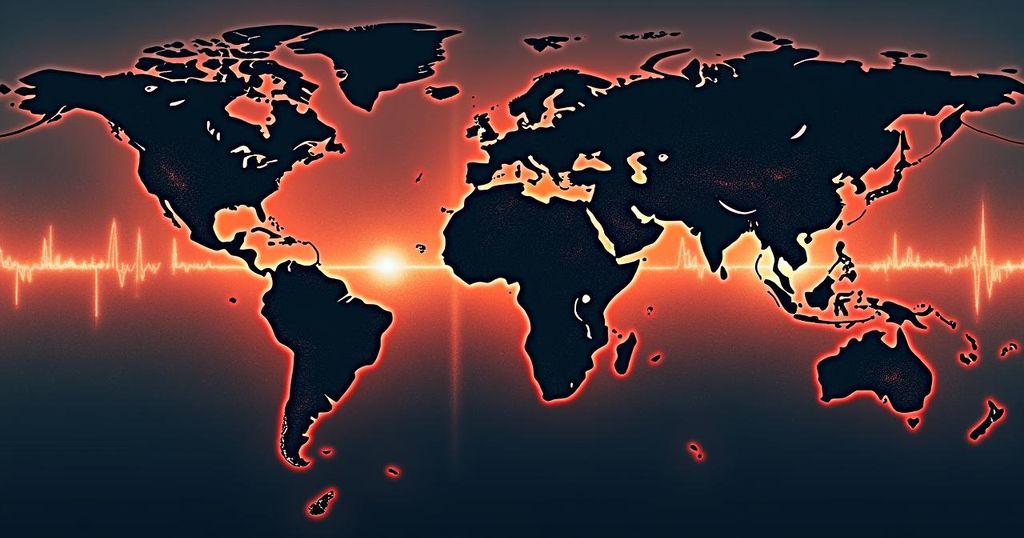The death of Hezbollah leader Hassan Nasrallah in an Israeli airstrike has sparked significant speculation about the future of Lebanon’s political landscape. While some view this as a potential end to Hezbollah’s dominance, there are fears of civil unrest and instability amid widespread mourning and dislocation of communities. The response to his death reflects deep divisions and uncertainties within Lebanon, highlighting the complex geopolitical implications of this significant event.
The recent death of Hassan Nasrallah, the leader of Hezbollah, following an Israeli airstrike on his bunker in Beirut, has begun to evoke profound reflections about the potential transformation in Lebanon’s political dynamics after more than thirty years of his leadership. Observers note the possibility that Hezbollah’s hegemony may be waning, prompting a surge of speculation and anxiety regarding Lebanon’s future stability. Many fear that a power vacuum could return the country to the turmoil of civil conflict, reminiscent of the wars that ravaged it before Hezbollah’s emergence in the early 1980s. Nasrallah’s influence extended beyond mere political leadership; he had become a symbolic figure of resistance against Israel and the United States, not only within Lebanon but across the Middle East. The atmosphere in Beirut was tense following the airstrike, which was described as the most intense bombardment since a Hezbollah cross-border attack in late 2022. Witnesses reported a cacophony of sounds likened to thunder, followed by an urgent need for people to contact relatives amidst rising tensions and fear. Once rumors of Nasrallah’s death spread, Beirut transformed into a city awash with grief, confusion, and uncertainty. Displaced families, including Syrian refugees, flooded the streets. The death of such a pivotal figure left many Lebanese feeling unmoored; gunfire was heard intermittently, indicating a volatile mix of mourning and potential unrest. Following Hezbollah’s confirmation of Nasrallah’s demise, spontaneous rallies erupted, with the public expressing profound loyalty to their leader, even amid apparent disorganization within the party. Some loyalists outwardly blamed Iran for failing to intervene, while others directed their frustration at Syrian refugees, leading to violent occurrences in the streets. This tumultuous environment has given rise to various interpretations of the shifting political landscape, where figures such as Nabih Berri and Samir Geagea may see opportunities as Hezbollah faces instability. Across the Middle East, reactions varied, with some enemies of Hezbollah openly celebrating Nasrallah’s death, such as the residents of Syria’s rebel-controlled Idlib province. Yet, within Lebanon, most opponents maintained a careful distance from public comment, exhibiting the deeply entrenched divisions within society. Among those displaced by the airstrikes, personal stories emerged as testament to the chaos enveloping the city. One woman recounted the harrowing experience of fleeing from the bombing with her children, all the while mourning the loss of Nasrallah and his perceived defense of the Palestinian cause, despite his controversial political legacy.
Hassan Nasrallah’s assassination represents a significant turning point in Lebanese political dynamics. For over three decades, he led Hezbollah, a Shiite militant group that emerged as a major political and military force within Lebanon and aligned itself with Iranian interests. This relationship positioned Hezbollah as a formidable actor on the geopolitical stage, complicating Lebanon’s already fragile inter-sectarian balance. Nasrallah’s death is not merely a political event; it signifies a potential reordering of alliances and power, as various factions within Lebanon and beyond contemplate their next moves in the aftermath of his absence. The context of ongoing Israeli airstrikes in Lebanon, coupled with Syria’s devastating civil war and Iran’s influence, provides a backdrop for understanding the complex ripple effects that Nasrallah’s death may unleash across the region.
In conclusion, Hassan Nasrallah’s death signifies a seismic shift in Lebanon’s political landscape, raising questions about the future of Hezbollah and the potential risks of civil unrest. The immediate reactions within Lebanon showcase a society grappling with a mix of mourning, uncertainty, and fear of renewed conflict. As various factions ponder their next steps, the absence of such a commanding leader creates both opportunities and challenges for Lebanon and its neighbors in an increasingly volatile Middle East.
Original Source: www.theatlantic.com







